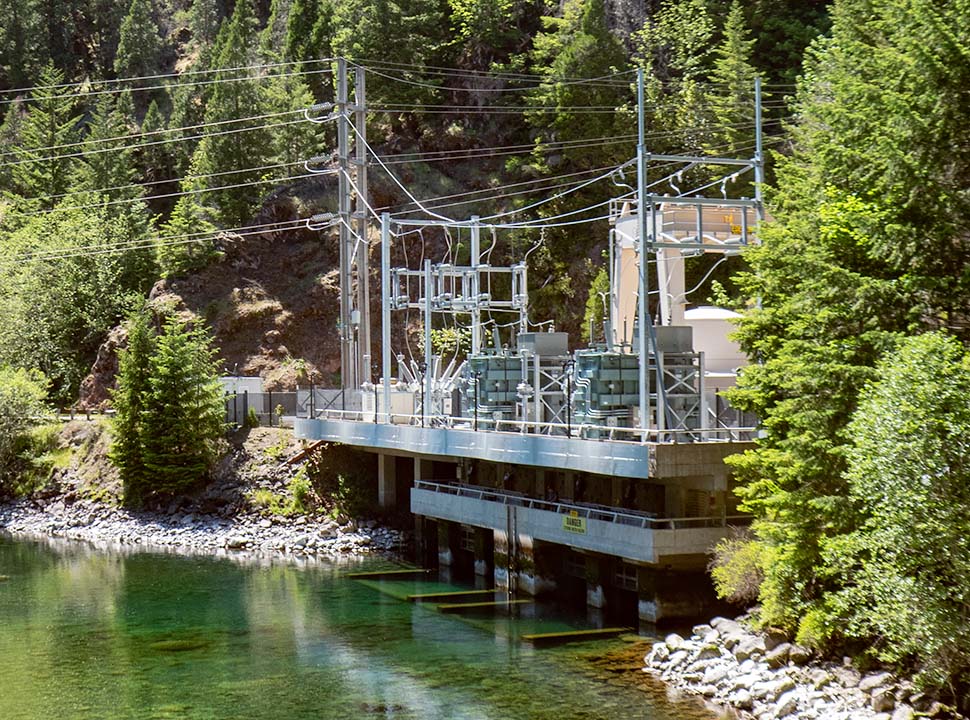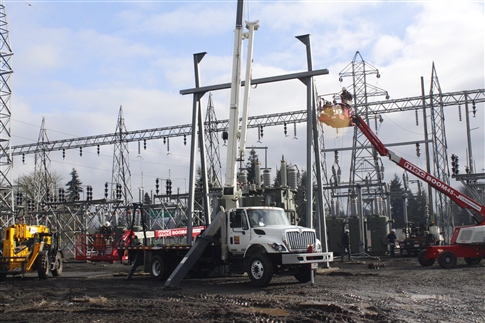Can't find what you're looking for?
Feel free to send an email or call us at 541-685-7000.
You may have questions about smart meters. On this page, you can find answers to the following questions:
- What is a smart meter?
- How do smart meters work?
- How has EWEB determined smart meters are safe?
- How often do smart meters transmit data?
- How are you protecting my privacy?
- What are the benefits of having smart meters?
- Why is EWEB upgrading to smart meters now?
- Are there additional fees to upgrade EWEB meters?
- Why isn't EWEB upgrading meters in the McKenzie River Valley service area?
- Can I opt out of having a communicating meter?
- Is there a fee for Manual Meter Reading?
- Is electromagnetic sensitivity considered a disability under the ADA?
What is a smart meter?
A smart meter is a digital meter that sends messages to EWEB through a secure wireless network. It's technology that provides a number of enhanced benefits and services to our customers. Smart meters are also an important building block in EWEB's efforts to modernize our community's electric and water distribution systems to provide customers with more reliable, resilient services.
More than 119 million smart meters are in place throughout the United States, according to the U.S. Energy Information Administration, about 75% of all electric meter installations nation-wide.
This data sheet includes the technical specifications for approximately 90% of the meters deployed by EWEB.
How do smart meters work?
Smart meters gather electric and water usage information and transmit that data to EWEB using a low-power radio over a secure, encrypted wireless network. The meters can also receive communication from EWEB, which allows for remote connection and disconnection of service. The information is sent using short radio transmissions similar to a text message sent from a cell phone.
How has EWEB determined smart meters are safe?
Just like many everyday devices such as baby monitors, cell phones and WiFi routers, smart meters communicate using radio signals. Smart meters result in much lower levels of radio frequency exposure than many of these common household electric devices. In fact, exposure levels are many times lower than with a cell phone held to the ear.
Radio Frequency Power Density Levels of Common Devices in microWatts/cm2 Based on Average Usage
| Device | Distance | Radio Frequency Power Density Level |
|---|---|---|
| Smart Meter - Non-communicating/Manually Read | Any distance | 0 microWatts |
| Television or FM radio | Nearby | 0.005 -1 microWatts |
| Wifi router | 3 feet away | 0.2 - 1 micoWatt |
| Smart Meter - Communicating | 4 feet away | 5 microWatts |
| Microwave oven | 2 feet away | 50 - 200 microWatts |
| Cell phone | At ear | 1000 - 5000 microWatts |
Data sources:
- Xylem/Sensus, supplier of EWEB smart meters
- Electric Power Research Institute (EPRI) - Radio-Frequency Exposure Levels from Smart Meters: A Case Study of One Model
- SmartEnergy Consumer Collaborative - Radio Frequency and Smart Meters
Radio frequency emissions from smart meters are far below the limits set by the Federal Communications Commission (FCC). The smart meters we are installing fully comply with FCC health and safety standards. EWEB referenced many third-party resources that provide peer-reviewed medical research, like the American Cancer Society and the National Institute of Health for additional information regarding health impacts of smart meters.
Learn more about advanced meters and radio frequency emissions by downloading this fact sheet (PDF).
How often do smart meters transmit data?
Electric meters typically transmit data to EWEB about once per hour. Smart meters emit radio frequency only when they transmit data, which, in total, is typically less than 1 minute per day. Water meters transmit every four hours. The messages sent by the meters are each about the size of a cell phone text message and help ensure that EWEB receives the complete information it needs to provide advanced services to customers. As EWEB approaches full deployment, we will be tuning the network to reduce any communications not needed for operations.
How are you protecting my privacy?
Smart meters do not collect any personal information such as names, addresses, or payment details. Usage data is delivered to EWEB via a secure, encrypted wireless network. We protect customers’ stored data using multiple layers of security, including firewalls. Only authorized EWEB personnel with a legitimate business need, such as billing or maintenance, can access usage data. EWEB does not sell customer information. Security protocols are not publicly detailed to prevent exploitation, but they comply with industry standards and regulations as well as EWEB’s Personal Identifiable Information Standards.
What are the benefits of having smart meters?
Smart meters are a part of our effort to provide customers with better service and more choice and control, while keeping services affordable. Some services will be available following the meter upgrades, while others will be available in future years. We will let you know more about products and services as they are developed.
Better service
- EWEB smart water meters can help protect your property by detecting water leaks, saving you money and hassle.
- EWEB smart electric meters will help us respond faster to restore power after an outage, and can help prevent future outages by giving our staff better insight into the performance and health of the electrical system.
- Customers with smart meters will also have the benefit of automatic meter readings. You will no longer need to provide a meter reader access to your property each month.
- Stopping, starting or transferring your utility service is made simpler with smart meters. In many cases, we won't have to send an EWEB representative to your home or business.
More choice and control
- In the future, you will be able to make informed choices about how and when you use water and electricity in your home or business by reviewing detailed usage data and setting up usage alerts to better control your bill.
- Smart meters will allow EWEB to offer flexible pricing plans (expected to be available in future years) to match customer budgets, lifestyles and needs. And as systems are developed we will also be able to provide new payment solutions that give customers more choice over how and when to pay bills.
Keeping services affordable
- The ability to synchronize our power supply with customer demand will help keep generation and distribution costs down. Smart meters help us project how much power we need at any given time so we can make infrastructure and power supply investments that align with our affordability initiative.
- With more information we can perform targeted preventive maintenance resulting in fewer unplanned water or power outages outside of regular business hours when the cost of such repairs is increased.
Why is EWEB upgrading to smart meters now?
Smart meters have been installed in more than 71 million homes and businesses throughout the United States. EWEB has been studying smart meters for almost two decades and we are confident the technology is mature and the meters meet our high safety and security standards. This timeline highlights smart metering discussions and decisions at board meetings over 20 years (PDF).
Smart meters are an important piece of our efforts to modernize the electrical grid and water distribution network to create more resilient and efficient systems.
Why isn't EWEB upgrading meters in the McKenzie River Valley service area?
EWEB has not yet installed smart meters in the McKenzie River Valley (including Thurston, Walterville, and Leaburg) due to the area’s hilly, forested terrain, which presents challenges for the communication equipment used in our smart meter network.
While we have been exploring cost-effective options to bring advanced services to the area, we have recently paused certain infrastructure investments—including planning and deployment of smart meters—as we evaluate a potential realignment of our service territory.
Read more...Can I opt out of having a communicating meter?
EWEB has a Manual Meter Reading option for customers who do not want Automatic Meter Reading and other advanced services. EWEB plans to introduce fees in 2026 for customers who choose Manual Meter Reading. Learn more about customer options.
Is there a fee for Manual Meter Reading?
EWEB plans to introduce fees for customers who choose Manual Meter Reading instead of Automatic Meter Reading. As Manual Meter Reading is no longer part of our standard operating model, it is now considered an additional cost. Fees will be designed to offest the actual costs of providing manual reads, including labor, travel, vehicle and equipment use, and administrative overhead and will apply uniformly to all customers who request this service, regardless of the reason. We anticipate presenting new fees to the EWEB Board of Commissioners in 2026.
Is electromagnetic sensitivity considered a disability under the ADA?
EWEB has reviewed our metering policies—including the proposed Manual Meter Reading fees—in the context of the Americans with Disabilities Act (ADA) and concerns related to electromagnetic sensitivity (EMS). While we acknowledge that some customers have health concerns regarding EMS, it is not currently recognized as a condition that qualifies for reasonable accommodation under the ADA.




